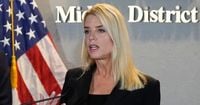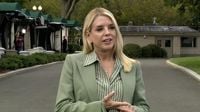In the wake of conservative activist Charlie Kirk’s assassination at a Utah university event, a fierce national debate has erupted over the boundaries of free speech, the role of government, and the meaning of “hate speech” in American law. The controversy, which has drawn condemnation and concern from across the political spectrum, centers on recent comments by U.S. Attorney General Pam Bondi and a series of official actions and public statements that critics say threaten the First Amendment’s core protections.
It all began on September 15, 2025, when Attorney General Pam Bondi appeared on a podcast hosted by Katie Miller. In the emotionally charged aftermath of Kirk’s murder, Bondi declared, “We will absolutely target you, go after you, if you are targeting anyone with hate speech.” She argued, “There’s free speech, and then there’s hate speech, and there is no place, especially now, especially after what happened to Charlie, in our society.” Her remarks, made in the context of growing online vitriol following Kirk’s death, suggested a federal crackdown on those expressing hateful opinions.
The backlash was swift and broad. According to Anchorage Daily News, Bondi’s comments were criticized by both conservatives and liberals, who reminded her—and the nation—that there is no federal offense of “hate speech.” Sen. Ted Cruz, a Texas Republican, stated bluntly, “The First Amendment absolutely protects hate speech. It protects vile speech. It protects horrible speech. What does that mean? It means you cannot be prosecuted for speech, even if it is evil and bigoted and wrong.” California Rep. Ro Khanna, a Democrat, posted a video clip of Bondi’s interview on X (formerly Twitter), questioning the administration’s commitment to First Amendment principles.
Prominent conservative commentators joined the chorus. Erick Erickson called Bondi a “moron,” while Fox News’ Brit Hume pointed out that “hate speech may be repulsive, but it is protected by the First Amendment.” Maggie Moda, another conservative voice, said Bondi sounded like “every constitutionally illiterate liberal you’ve debated over the past ten years,” and insisted that Kirk “wouldn’t have wanted this.” Steve Cortes, a former Trump advisor, argued that Kirk “rightly despised” hate speech laws and called for Bondi’s removal. On the left, Cenk Uygur of The Young Turks praised conservatives for defending free speech, and journalist Glenn Greenwald labeled Bondi’s stance “a noxious claim” and “the foundation of left-liberal censorship.”
Faced with mounting criticism, Bondi took to X on September 17 to clarify her position. “Hate speech that crosses the line into threats of violence is NOT protected by the First Amendment. It’s a crime,” she wrote. She further accused the “radical left” of normalizing threats and political violence, vowing, “That era is over.” Yet, as CBS News reported, Bondi’s clarification did little to quell concerns, as many saw her statements as conflating protected speech with criminal conduct.
The legal reality, as outlined by Supreme Court Justice Elena Kagan in a 2023 opinion, is that only “true threats”—serious expressions conveying an intent to commit unlawful violence—fall outside First Amendment protection. Mere offensive or hateful statements, no matter how distasteful, are not prosecutable. This high bar is designed to safeguard robust public discourse, even when it includes “ugly” or “gross” speech, as Kirk himself had famously argued in 2024: “Hate speech does not exist legally in America. There’s ugly speech. There’s gross speech. There’s evil speech. And ALL of it is protected by the First Amendment. Keep America free.”
Bondi’s comments were not the only government actions to raise eyebrows. The Pentagon announced plans to “address” federal employees who mocked or celebrated Kirk’s death, and the State Department said it would revoke visas from those posting celebratory messages online. Vice President JD Vance encouraged listeners to call the employers of anyone “celebrating Charlie’s murder.” President Trump himself, when asked about Bondi’s remarks, told ABC News’ Jonathan Karl, “We’ll probably go after people like you because you treat me so unfairly; it’s hate.”
Meanwhile, the fallout extended to the media. ABC announced it would indefinitely remove Jimmy Kimmel’s show after FCC Chair Brendan Carr called for action over Kimmel’s comments linking Kirk’s alleged killer to Trump supporters. Station owners Nexstar and Sinclair, both seeking FCC approval for a major merger, said they made the decision unilaterally. President Trump congratulated ABC, urging NBC to do the same with other late-night hosts. FCC Commissioner Anna Gomez, the commission’s lone Democrat, called the move a dangerous precedent, warning on CNN, “This administration is increasingly using the weight of government power to suppress lawful expression, not because it glorifies violence or breaks the law, but because it challenges those in power and reflects views they oppose.” Sen. Elizabeth Warren also condemned the action, emphasizing, “The point is one of the government not coming in and making decisions about whose speech gets heard.”
Legal experts have weighed in to clarify the boundaries. Adam Goldstein of the Foundation for Individual Rights and Expression told CBS News, “I especially don’t want to see an attorney in charge of the Justice Department saying that. It’s the kind of thing that would get you a bad grade in your constitutional law class.” First Amendment attorney Jenin Younes noted, “The worry is that lawmakers will just define hate speech to mean anything the opposite party says, and so that’s why the court has said it’s not up to the government to decide what’s within the bounds of acceptable discourse and what’s not.” University of Chicago law professor Genevieve Lakier added, “There’s no definition of hate speech, because the whole point is there’s no neutral definition of hate speech.”
Some government officials and agencies have even considered punishing private businesses. Bondi threatened legal action against an Office Depot employee who allegedly refused to print flyers for a Kirk vigil, arguing, “Businesses cannot discriminate.” Yet, Supreme Court precedent protects businesses from being compelled to produce speech they disagree with, as seen in cases involving same-sex wedding services. UCLA law professor Eugene Volokh told CBS News, “There is no federal law that prohibits copy shops or print shops from discriminating based on the content of the message.”
As the debate rages, the chilling effect is palpable. Legal scholars like Volokh warn that government threats—however rhetorical—risk confusing the public about their rights and may encourage overreach. “I think they may also kind of send a message that we are going to try to find a way of punishing this speech,” he said. Goldstein reflected on the irony: “What a weird way to react in memory of Charlie Kirk, who was known for listening to people and disagreeing with them, and moving on.”
The controversy has exposed deep divisions over where to draw the line between speech and crime, and whether government officials can be trusted to make that call. For now, the First Amendment’s protections remain robust, but the debate over hate speech and free expression is far from settled.



